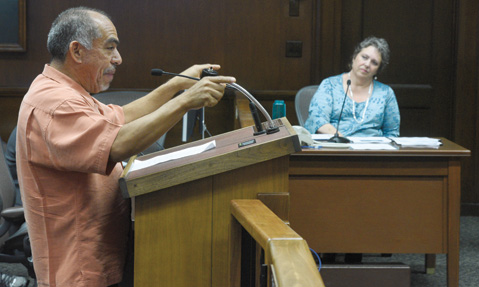Bogeys and Faults at Muni and Elings
Outgoing Parks and Rec Leader Juggles Backlash on Two Fronts

It would’ve been easy to argue that not a single soul inside City Hall’s chambers Monday night wanted the demise of Mulligans Café & Bar in any way, shape, or form. Regardless, an air of uncertainty remains over the future of the longstanding restaurant situated on Santa Barbara’s municipal golf course.
As play has dropped over the years, Muni, as it’s called, has dug deeply into its reserve funds, and city councilmembers are now weighing the pros and cons of handing over the reins to a private management company. That bodes badly for Mulligans, especially in light of Monday’s Parks and Recreation Commission recommendation that elected leaders opt for a three-pronged approach that puts the links, pro shop, and restaurant under unified, outsourced management.
While a newly installed management company could conceivably re-up with Mulligans as Muni’s food and beverage concessionaire, it’s not a guarantee. With that question hanging in the air, Mulligans can only hurry up and wait — its contract with the city doesn’t expire until June 30, 2016, and between now and then, a July 28 City Council hearing and the November 3 citywide election promise to intensify the issue.
On paper, nobody — including city bean counters — can contend that Mulligans is not a solid moneymaker. In fact, said owner Mario Medina, since he picked up the then-bankrupt eatery 23 years ago, it’s established a sales history that has only gone up, year after year. He’s projected to hit $1.6 million this year, he added, 10 percent of which goes to city coffers.
Beyond the numbers, Mulligans has become a home base for a community of golfers and non-golfers alike, a place of birthdays, wedding receptions, and fundraisers, according to tearful testimony at Monday night’s meeting. “I ask you to rethink this,” Medina said, addressing the commission. “Are we sure there’s another [restaurateur] who can do what I’ve been doing?”
Medina and others — including some members of the Golf Advisory Committee — have encouraged the city to avoid comprehensive privatization and instead focus on the heart of Muni’s financial woes: the fact that green fees haven’t been able to cover the cost of course maintenance. If anything, speakers urged, leave the restaurant and pro shop alone and get a handle on maintenance overhead.
In explaining why that option wasn’t endorsed, commissioners cited the fundamental goal of creating a “self-sustaining and synergistic golf experience” while maintaining policy control through a single contract, not two or three.
“We know that this is a difficult discussion,” Parks and Recreation Director Nancy Rapp told the crowd. “The fact that we have a full chamber here tonight is good — a big public discussion.”
As Rapp closes in on retirement, her department’s endorsement of a privatized golf course isn’t the only issue ratcheting up the workload — and public backlash — until her August 7 departure. On Tuesday night, council chambers brimmed with tennis players concerned about the privately managed Las Positas Tennis Courts, situated on city property overseen by the Elings Park Foundation.
In the throes of the Great Recession five years ago, Parks and Recreation — hardest hit of all city departments — gave the foundation control of the tennis courts, which, like Muni’s links, were in the red financially. Since then, say the courts’ original locals, the facility has become overpriced, underused, and, in the words of one speaker, “essentially a private club.”
Such sentiments take on new meaning these days, as Elings has started raising private monies for a $2.5 million facelift and endowment, which has already survived a few layers of architectural review and could possibly break ground next spring.
While none of the councilmembers had anything but praise for the foundation’s efforts across the greater 230-acre Elings Park, Cathy Murillo and Gregg Hart questioned the sustainability of the tennis program’s business model and a planned renovation that seems to be banking on the old motto, “If you build it, they will come.”
“I look at the trends of tennis, and I wish it was more popular,” Mayor Helene Schneider said in closing.



